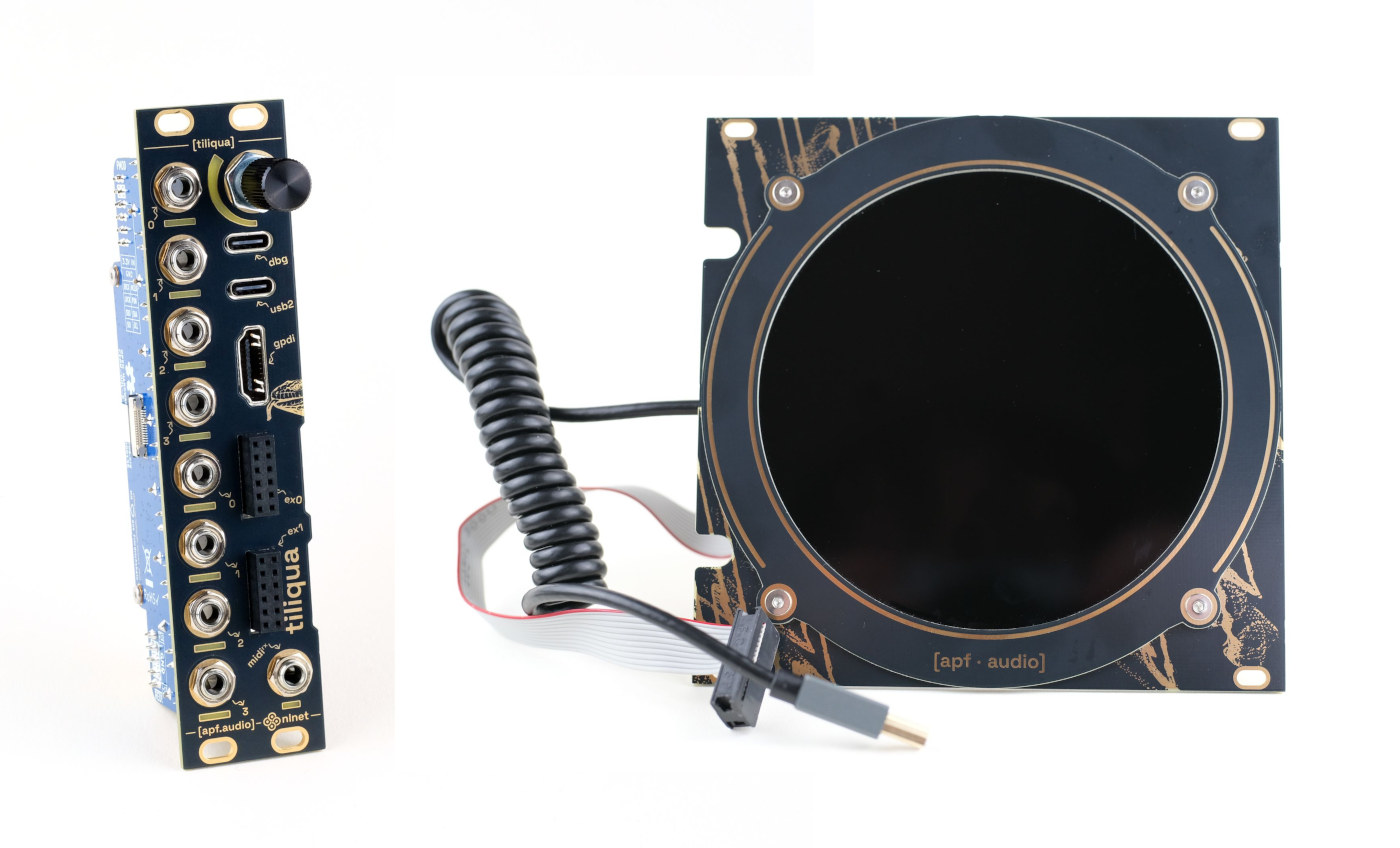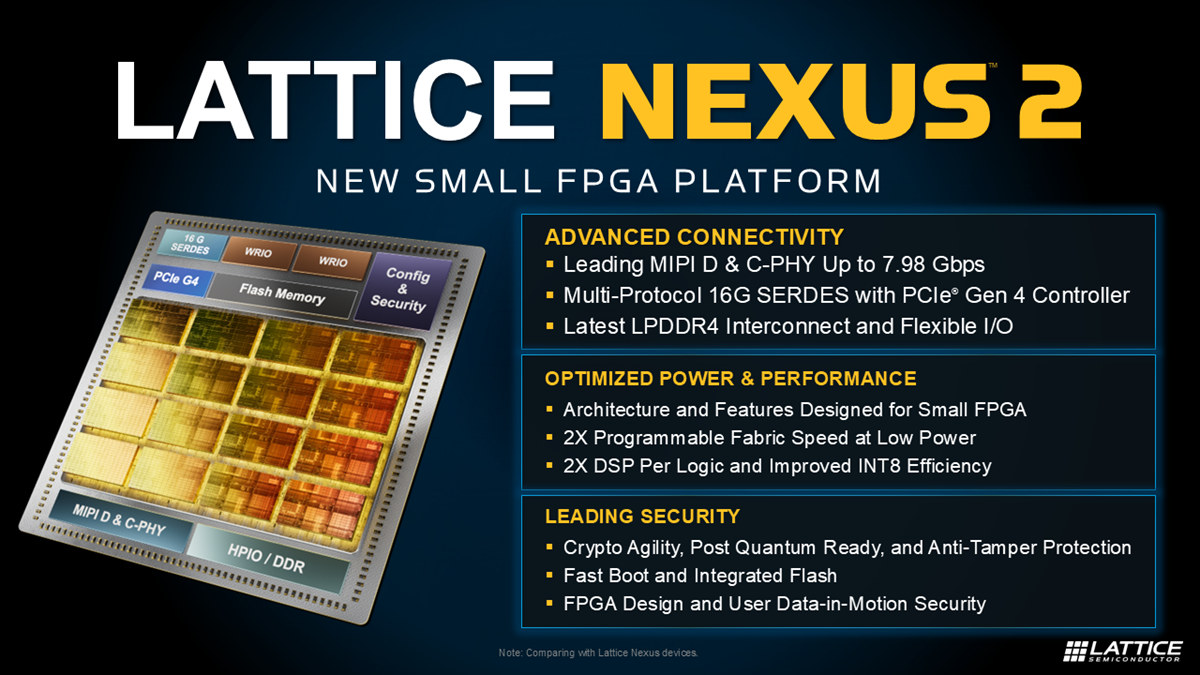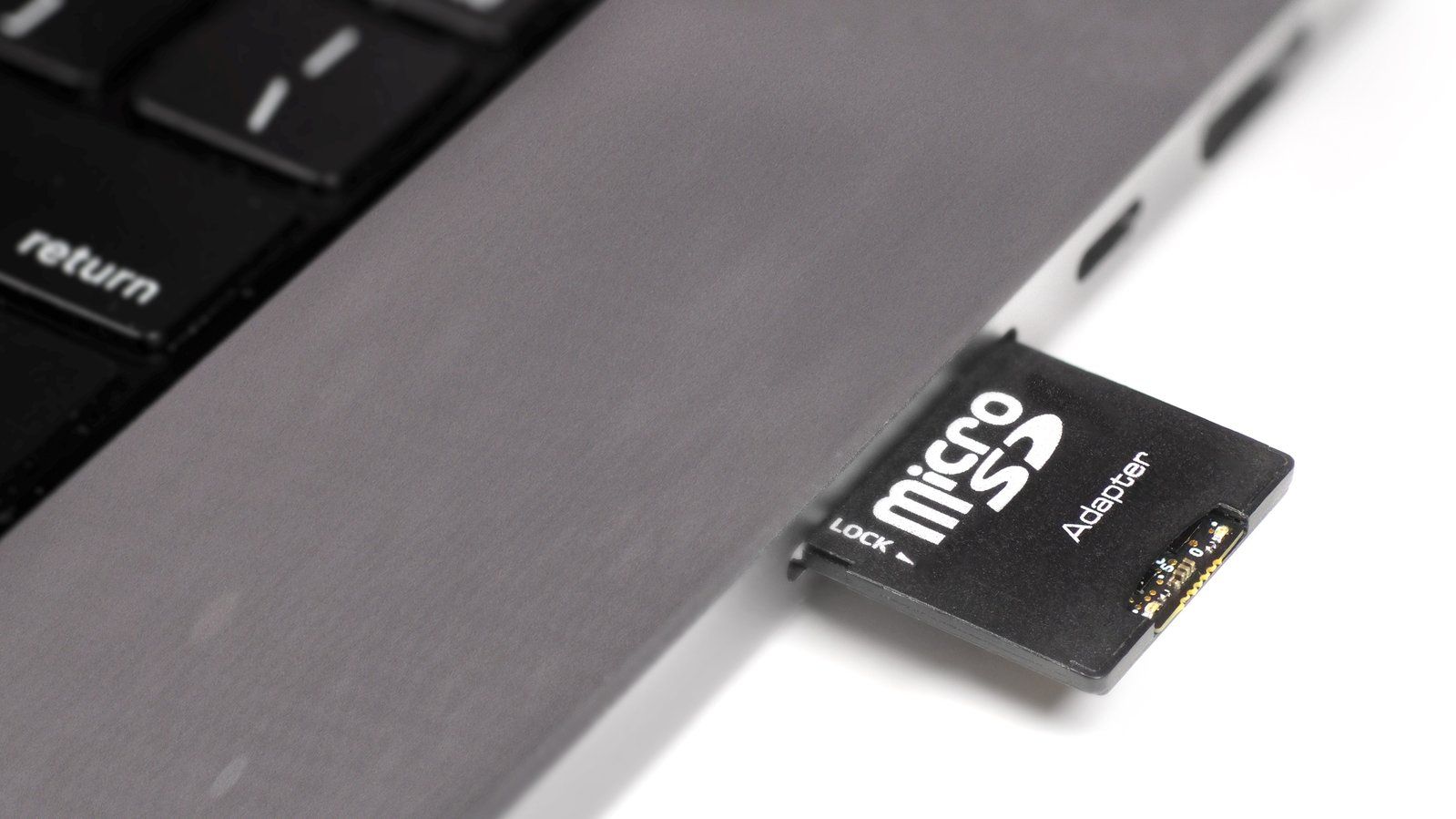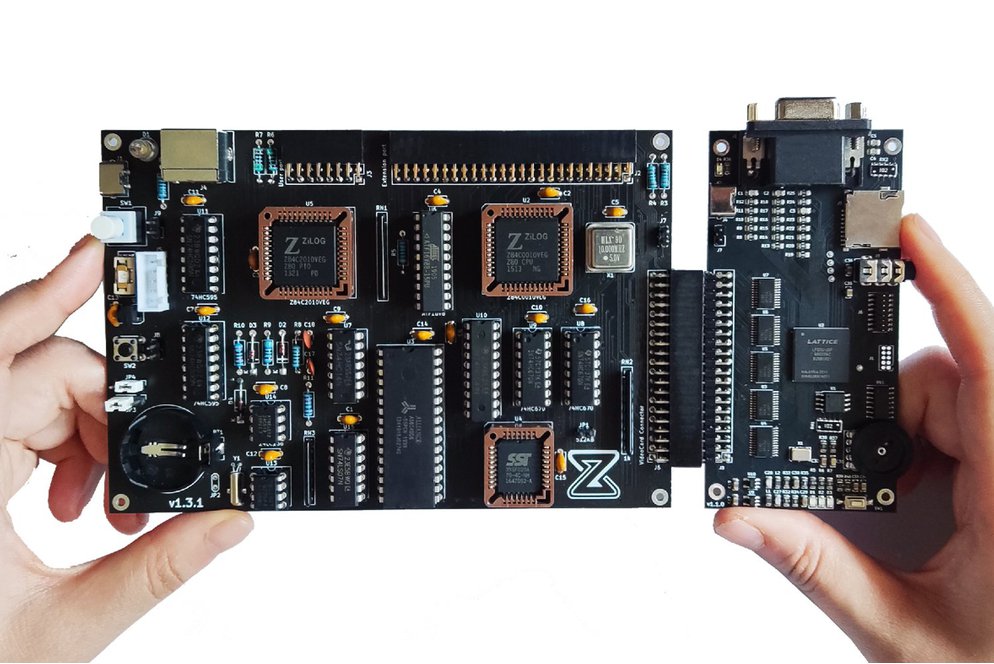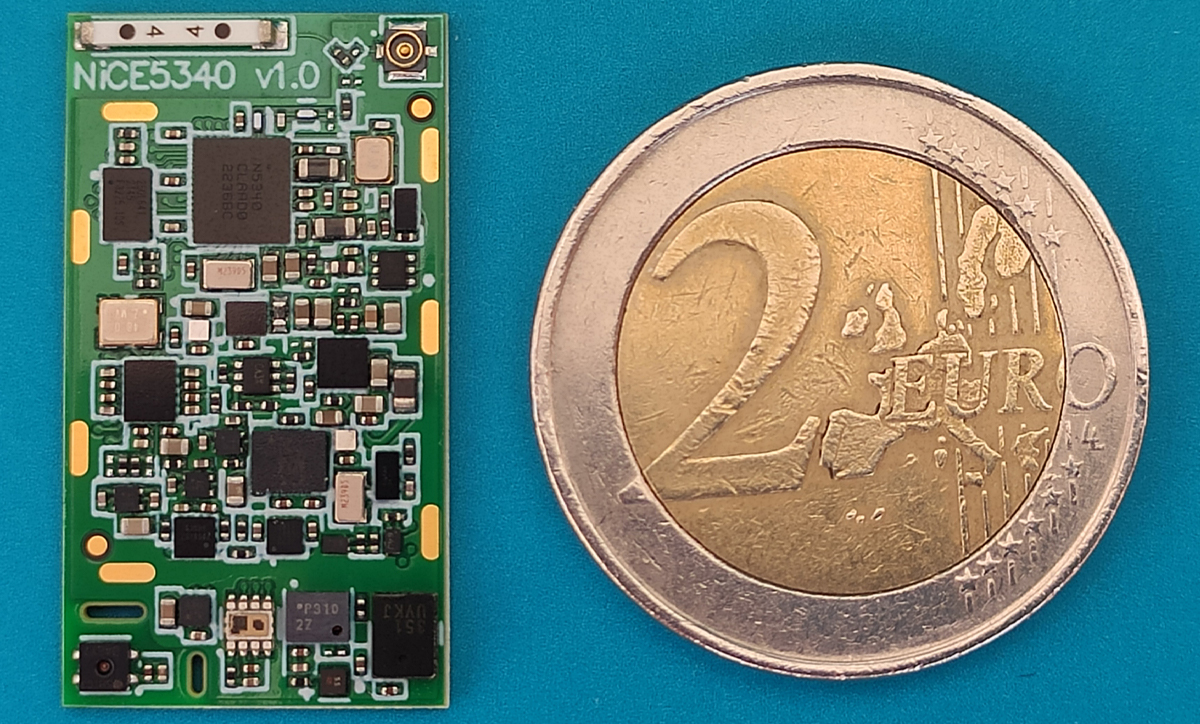Tiliqua is a Lattice ECP5 FPGA multitool board designed for audio and visual synthesis and compatible with the Eurorack modular synthesizer format. The board features four audio input jacks and four audio output jacks, all of which can be used as touch-sensitive inputs when not connected. Other interfaces include a USB 2.0 Host/Device port, MIDI support, two PMOD expansion connectors, and a display interface to connect the Tiliqua screen for visual effects. All those features make it suitable for audio-rate modulation, low-latency effects, video synthesis, high-speed USB audio, or emulating retro hardware. Tiliqua specifications: FPGA – Lattice ECP5 (LFE5U-25F-6BG256) FPGA supported by the open-source FPGA flow System Memory – 32MB PSRAM (tested up to 200MHz DDR / 400MB/s) Storage 16MB SPI flash for the FPGA 16MB SPI flash for the Raspberry Pi RP2040 2Kbit I2C EEPROM: for storing calibration constants Video Output – Digital video GPDI (General Purpose Differential Interface) […]
Lattice unveils Nexus 2 small FPGA platform, Lattice Avant 30 and Avant 50 mid-range devices, updated Lattice design software tools
Lattice Semiconductors announced several new FPGAs and software tools at the Lattice Developers Conference 2024 which took place on December 10-11. First, the company unveiled the Nexus 2 small FPGA platform starting with the Certus-N2 general-purpose FPGAs offering significant efficiency and performance improvements in this category of devices. The Lattice Avant 30 and Avant 50 were also introduced as mid-range FPGA devices with new capacity options to enable edge-optimized and advanced connectivity applications. Finally, the company releases new versions of Lattice design software tools and application-specific solution stacks to help accelerate customer time-to-market such for edge AI, embedded vision, factory automation, and automotive designs with Lattice Drive. Let’s have a look at the highlights of each announcement. Lattice Nexus 2 small FPGA platform and Certus-N2 FPGA Highlights and benefits of the Lattice Nexus 2 small FPGA platform: Power Efficiency against similar class competitive devices Up to 3x lower power Up […]
Signaloid C0-microSD is an iCE40UP5K FPGA SoM in the microSD card form factor (Crowdfunding)
Cambridge-based hardware and cloud computing company, Signaloid has begun crowdfunding for the C0-microSD – a tiny, programmable iCE40UP5K FPGA system-on-module (SoM) in a microSD card form factor. It comes preloaded with a RISC-V softcore and users can also load custom FPGA designs onto the board. Part of the Signaloid C0-microSD’s unique appeal is its SD card form factor, which allows it to fit in unused full SD or microSD slots. This allows the implementation of FPGA-based hardware acceleration in systems without traditional expansion interfaces like PCIe M.2 slots. It can also be interfaced with as a standard SD block device and used to bring hardware-accelerated data processing to existing industrial automation, manufacturing, and robotics systems. The iCE40UP5K FPGA SoM has two main use cases: a hot-pluggable FPGA module or a hot-pluggable RISC-V co-processor module. The SD interface allows you to load custom FPGA bitstreams and applications onto the module from […]
Lattice MachXO5D-NX FPGA family enables Hardware Security in Programmable FPGAs
Lattice Semiconductor has recently introduced the MachXO5D-NX FPGA family, which integrates a hardware root of trust (RoT) into low-power FPGAs. This addresses security challenges by combining on-chip Flash memory and hardware encryption to minimize code capture risks during load time. The MachXO5D-NX family includes three variants with logic cell counts of 27k (FMXO5-25), 53k (LFMXO5-55T), and 96k (LFMXO5-100T). These FPGAs feature built-in hardware encryption, a cryptographic engine supporting AES-256, ECDSA-384/521, SHA2-256/384/512, and RSA 3072/4096, and a unique secret identity (USID) for device identity protection. Built on a 28-nm fully-depleted silicon-on-insulator (FD-SOI) process, these FPGAs reduce power consumption by 75% and lower soft error rates by 100x(as the company mentions). They support interfaces such as MIPI D-PHY (CSI-2, DSI), LVDS, Gigabit Ethernet, and PCIe, making them suitable for secure edge applications. Lattice MachXO5D-NX FPGA family specifications FPGA – Lattice Semi MachXO5D-NX FPGA family (27k (FMXO5-25), 53k (LFMXO5-55T), and 96k (LFMXO5-100T)) Programmable […]
Lattice Semi Certus-NX-09 and Certus-NX-28 small footprint, low-power FPGAs feature optional PCIe Gen2 interface
Lattice Semiconductor has added two new devices to its small, low-power Lattice Certus-NX FPGA family, namely the Certus-NX-28 and Certus-NX-09 available in multiple packages and designed for communications, computing, industrial, and automotive applications. The Certus-NX FPGAs enable power-efficient PCIe Gen 2 with up to 4 times lower power compared to other FPGAs, and ultra-small form factor with up to 2 times more I/O per mm2 and PCIe and Gigabit Ethernet implementation in packages as small as 36 mm2. The company also claims high reliability and security with up to 100 times lower soft error rate, built-in SEC (Soft Error Correction) and memory block ECC for SEU (Single-Even Upset) protection, and up to 12 times faster instant-on configuration performance. The Lattice Certus-NX family is now comprised of four SKUs: LFD2NX-9, LFD2NX-17, LFD2NX-28, and LFD2NX-40 whose main highlights are shown in the comparison table below. The Certus-NX are available in various packages […]
$180 Zeal 8-bit Computer Complete Edition is an all-in-one retrocomputing platform based on the Zilog Z80 microprocessor
The Zeal 8-bit Computer Complete Edition is a system that aims to bring retrocomputing to the modern age with the aid of a motherboard built around the Zilog Z80 microprocessor and several peripherals. The Zeal 8-bit Computer project began in early 2021 and has been released in bits and pieces since then. Now, a finalized version tagged the “Complete Edition” is ready for release to the public. It promises a modern retrocomputing experience with the simplicity of retro computers and support for relatively recent features such as VGA graphics, TF cards, and NOR flash. The Zeal 8-bit Computer Complete Edition includes the following components: the Zeal 8-bit Computer motherboard, the Zeal 8-bit Video Board, and a 3D-printed enclosure with a touch sensor for turning the board on/off. The Zeal 8-bit Video Board is based on a Lattice ECP5 FPGA and can output up to 65,536 colors via VGA. It also […]
The RPGA Feather dev board pairs RP2040 chip with a Lattice iCE40 FPGA for sensor fusion projects
Oak Development Technologies’ RPGA Feather board integrates the Raspberry Pi RP2040 microcontroller with the iCE5LP4K FPGA from Lattice Semiconductor into a compact development board in the Adafruit Feather form factor. The iCE5LP4K FPGA is an ultra-low-power chip in the iCE40 Ultra product family designed for mobile applications such as smartphones, tablets, and handhelds, while the Raspberry Pi RP2040 microcontroller makes it much easier to program the FPGA using CircuitPython. We have seen Oak Development Technologies’ earlier forays into FPGA Feather-compatible products such as the IcyBlue board (also based on iCE5LP4K FPGA) and the Lattice FeatherWing. RPGA Feather specifications: MCU – Raspberry Pi RP2040 dual-core Cortex-M0+ microcontroller @ 133 MHz with 264KB SRAM FPGA – Lattice Semiconductor iCE5LP4K FPGA Logic Cells – 3,520 logic cells Memory 80 Kbits of embedded Block RAM (EBR) Distributed RAM: 640 bits 2x hardware I2C blocks and 2x hardware SPI blocks 26 I/Os for customized interfaces […]
NiCE5340 SoM packs Nordic nRF5340 MCU, Lattice iCE40 FPGA, and 11 sensors into a tiny 29x16mm form factor
Stefano Viola’s NiCE5340 SoM is built around a Nordic Semi nRF5340 Bluetooth SoC, an iCE40 FPGA, 11 sensors, a battery charger, and various other peripherals in a 29×16 mm form factor. The nRF5340 used in the SoM is a low-power, dual-core Arm Cortex-M33 SoC with Bluetooth 5.4, Bluetooth LE (BLE), Thread, Zigbee, and other proprietary protocols. Meanwhile, the Lattice iCE40 FPGA features 3520 logic cells, 80 Kbits of embedded Block RAM, I2C, and SPI blocks, and many other features that make it suitable for applications like environmental monitoring, health tracking, and others. Previously, we have written about Unexpected Maker NANOS3, TinyS3, FeatherS3, and ProS3 boards, and ESP32-S3 4G dev board which all fall under the tiny and compact board category but this is the first time we have seen an MCU board with so many features built into a module of that size. Stefano Viola’s NiCE5340 SoM Specification ICs Nordic […]


